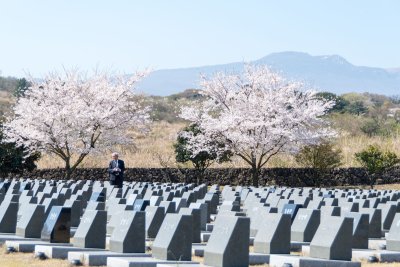A man tends to a tombstone in the Tombstone Park for the Missing within the Jeju 4.3 Peace Park in Jeju City, South Korea, on Sunday, April 2, 2023, a day before the 75th anniversary of the Jeju Massacre. File Photo by Darryl Coote/UPI
JEJU ISLAND, South Korea, April 14 (UPI) — Archives documenting an early Cold War-era massacre on a South Korean island and the decadeslong truth-finding process seeking reconciliation that followed has been selected by UNESCO for preservation, recognizing the Jeju Massacre documents as world heritage that belongs to all.
The Executive Board of UNESCO made the decision to inscribe “Revealing Truth: Jeju 4.3 Archives” onto its Memory of the World Register on Thursday during a meeting in Paris, according to both the South Korean and Jeju Island governments.
The archives detail not only the Jeju Massacre — known as Jeju 4.3 in Korean, when an estimated 30,000 people were killed on Jeju Island during the newly founded South Korean government’s suppression of a communist revolt between 1947-54 — but also the grassroots truth-finding movement that followed.
It consists of 14,673 items, including nearly 14,000 documents, more than 500 videos, 94 audio recordings, 25 postcards, 20 booklets, 19 books and one epitaph.
They include documents from the time of the massacre, including judicial trial records and reports and memorandums by the U.S. military government and advisory group, as well as those produced afterward through testimonies of survivors and findings by non-governmental organizations.
Jeju Gov. Oh Young-hun celebrated the archive’s adoption into UNESCO’s Memory of the World as a collective accomplishment made possible by islanders, bereaved families, government officials, scholars and civil society “who have worked together over many years to uncover the truth of 4.3.”
“Thanks to your efforts, Jeju 4.3 will now be passed down as a legacy for the world,” he said in a statement. “To all the citizens who have walked this long path with us, Jeju 4.3 has become a global history that awakens the values of reconciliation, coexistence, peace and human rights.”
Created in 1992, the Memory of the World Program seeks to preserve and protect the world’s documentary heritage.
Jeju submitted its application for inclusion in the program in November 2023, with the campaign having officially begun in 2018 though discussions surrounding the possibility of adoption in the program date back to 2013.
Ban Youngkwan, manager of the research department at the Jeju 4.3 Peace Foundation, which was behind the application, told UPI in a recent telephone interview, that inscription into UNESCO’s Memory of the World program represents international recognition of not only the massacre but the democratic movement to preserve it.
“We would like to believe that it is a kind of acknowledgement of the solution … not just about the past atrocity, but also the solution of Jeju April 3, which is like a bottom-up project,” he said.
Though the atrocity resulted in the deaths of 10% of Jeju’s population in the years following Korea’s liberation from Japan and razed tens of thousands of homes and hundreds of villages, it was little known even in South Korea as victims were silenced for generations due to stigma and government reprisals.
Only through the perseverance of activists, academics and the Jeju people was the history of the massacre collected and preserved, leading to the government eventually initiating investigations following democratization, culminating in the adoption of “The Jeju 4.3 Incident Investigation Report” in 2003.
That report, based on the documents in the archive, prompted South Korean President Roh Moo-hyun on Oct. 31, 2003, to issue a formal apology to the Jeju people.
“These records underscore the global significance of human rights and provide a meaningful example of how the people of Jeju have addressed a painful history through a spirit of reconciliation and mutual coexistence,” the Korea Heritage Service said in a statement.
Ban explained that in their application to UNESCO they state that these documents are a unique example of a truth and reconciliation movement initiated by civil society.
“That’s the key idea of our application,” he said ahead of UNESCO making its decision. “If they accept it, we would like to believe that they acknowledge those facts.”
With inclusion in the program, Ban suggested that it could mean more funding for preservation projects dedicated to Jeju 4.3 and it could have an educational effect, which could help the foundation’s movement — and that of the island — to make the massacre better known throughout the world.
Though it can be seen as mainly symbolic, the adoption as a Memory of the World is important recognition for bereaved families and activist and sends a message to those currently being victimized by state violence, Ban said.
“We would like to give them some kind of hope — [that] your dog days will pass and you can bring the truth [to light] like we did,” he said.
“We would like to give them so hope and also to teach new models over how you can [uncover] the truths and also rebuild their community after that, after state violence.”
With the inclusion of “Revealing Truth: Jeju 4.3 Archives,” South Korea how has 20 Memory of the World-registered documents.
